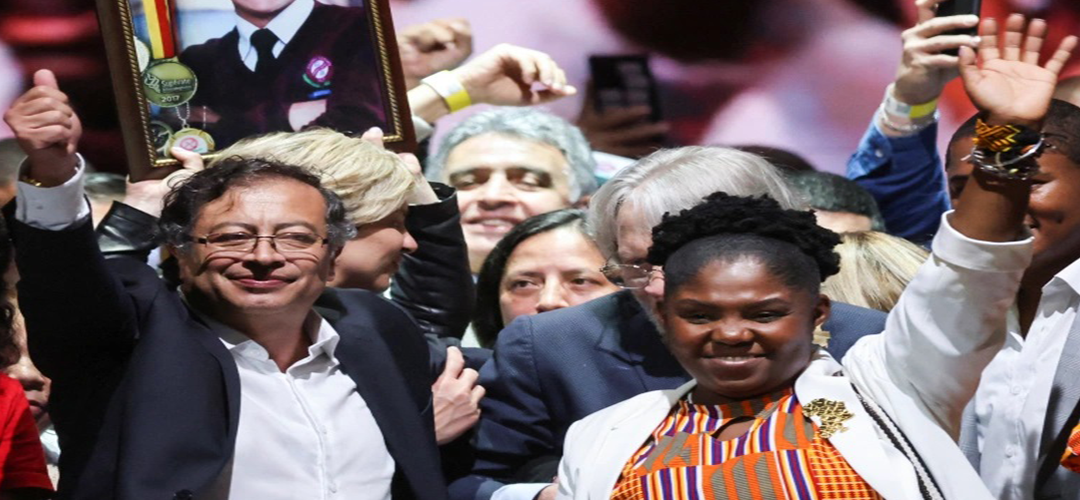COLOMBIA'S NEW “PINK TIDE”
July 2, 2022 | Expert Insights

The sun is rising on a new day for Columbians, mainly for those who Vice President-elect Francia Marquez calls the “nobodies.” This long list includes the majority in the country-women, Indigenous communities, Afro-Columbians, LGBTQ+, working class, disabled people and all others who have been disproportionately impacted by poverty, state violence, discrimination, and environmental ruination.
Ignored and deprived of hope by successive administrations, the election of the Left-wing Gustava Petro gives fresh hopes for the rise of a new brand of socialism in the region, which will finally tend to the needs of the 'nobodies’.
Background
For long, Colombia was better known for its internecine fighting and as the major launch pad for the global drug trade. Over four decades, a host of insurgents spearheaded by the formidable FARC wage a no-holds-barred insurgency supported largely by the drugs trade. With the U.S. supporting the government in Bogota with money, weapons and military advisers and the DEA running the war against the drug cartels, the conflict turned this beautiful nation into a humanitarian nightmare with violence taking into its embrace the entire region.
Finally, a peace deal between FARC and the government was signed in 2016, for which then-President Juan Manuel Santos won the Nobel Peace Prize for 2016. Erstwhile FARC guerrillas joined the political milieu and were let off with light non-custodial sentences such as joining landmine clearance operations or doing social work. Many, like the current President, have found a comfortable niche for themselves in politics.
In late 2019, the disillusioned youth poured out on the streets in huge numbers when an economically struggling right-wing government lowered the minimum wage for workers under 25 years old. This started a popular anti-government campaign, the “paro nacional” that brought the country to a standstill. Strike action and protests continued even at the height of the COVID-19 pandemic. In April 2021, an increase in taxes, corruption and healthcare reform proposed by the government activated a new protest wave. At least 44 protestors were killed, and hundreds were injured.

Analysis
Disillusioned by the right-wing and centrist political parties, the people have, for the first time, elected to the office of the President, a left-wing politician. Gustavo Petro, 62, is an ex-guerrilla from the M19 group (the second-largest rebel faction after FARC).
This triumph was not easy as in the second round of the election, Gustavo and Francia contested against Rodolfo Hernandez, a right-wing construction magnate who had the support of the outgoing conservative President Duque from the right-wing “Centro-Democratic" party who had been in power for more than two decades, and from media as well as compelling elites.
Despite running a belligerent campaign enthralled on anti-corruption, however, Hernandez-who is amusingly facing corruption attestations of his own-failed to secure the presidency.
History is created in Colombia as millions chose to vote for a left-wing anti-establishment duo assuring acute social and economic change. Their success was not accidental; years of grassroots marshalling and left-wing coalition edifice led to this moment. Indeed, there were signs of a progressive shift in Colombia long before this election.
The campaign overtures put forward by Petro and Marquez were still relatively modest. Tax reform has been promised that would impart the state with extra funds to ameliorate the education and health systems in the country and end Colombia’s fossil fuel dependence through a just energy transition.
The right-wing contended that the modest proposal was too ambitious, utopian, and counterproductive. Despite strong defiance from the establishment, people were clearly ready for and actively demanded systematic change.
In a sombre ceremony which was attended by the new President, Colombia’s Truth Commission demonstrated its report on the civil war in which it claims that nearly 450,000 Colombians died over the 60 years of confrontations. A promise was made by President Petro that the report would be used to bring real peace to the nation, saying that “truth cannot be used to create a space for vengeance.”
The left-wing’s victory is the advent of a new and positive chapter not only in Colombia but the entire region for various factors: (i) Petro secured the presidency on a vow to make Colombia a global leader in the fight against climate change, accentuating on his determination to better the living standards of Colombians while also working towards preserving the Amazon rainforest, (ii) Altogether Petro called upon other progressive leaders in Latin America to end their country's dependence on fossil fuels as a part of their plans for attaining economic and social justice.
The present-day government has promised an end to new licenses for fossil fuel exploration. Instead of fossil fuel production and consumption, which has brought so much destruction, displacement and violence to Colombia, the left-wing duo is accomplished to build a new green economy, hoping Colombia’s new covenant will provide environmental movements across Latin America and the world with a prototype for success.
Assessment
- Colombia has been a minor player in the arena of global, but it has held centre stage in the international drug trade and the appalling violence of its internal conflicts for over six decades. The results will also prove to be a provenance of inspiration for progressive social movements across the world.
- President Gustavo Petro delineates a new breed of Latin American leaders using their skills as guerrilla leaders in grassroots organising and coalition building to achieve results even against a huge pushback from the right-wing establishment. Hopefully, they will endure the long battle ahead and bring peace to their nation and act as a catalyst for the rest of the region.
- The “nobodies” in Colombia and across the region can now combine their efforts to build an inclusive, just, and prosperous future for all that is free of f violence, hunger and climate ravages. While it may sound a bit utopian at the moment, but then miracles can happen.The world is in dire need of some optimism.








Comments